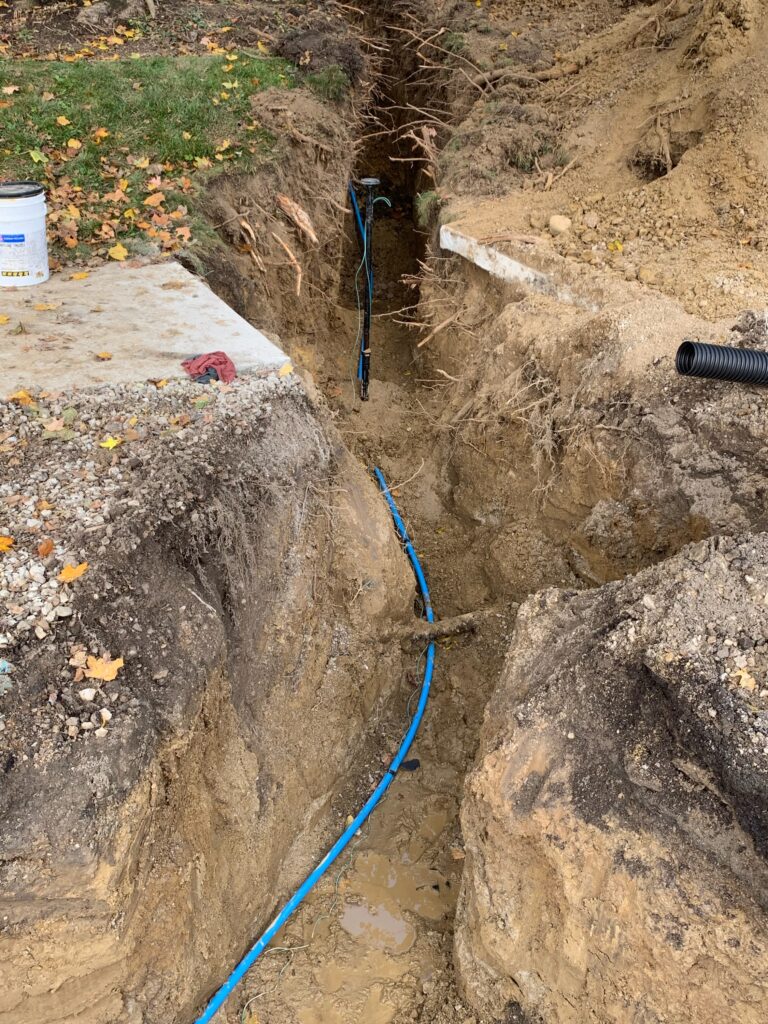Manchester ahead of schedule on lead-pipe replacement program

Photo shows the replacement for an old lead line in a trench leading up to the house. Several of the 100 older homes in the Village with lead pipes have already been replaced under a statewide program that gives communities 20 years to do the remediation. (Photo courtesy Village of Manchester)
Last week the Mirror published a report from Bridge Magazine about how the state is requiring municipal water systems to replace lead and galvanized water lines.
"As utilities across the state launch into a massive lead line replacement effort that is expected to be paid for largely by ratepayers, they are navigating a host of challenges — from the price to replace lead pipes, which can cost several thousand dollars per house — to where they’ll find enough contractors to do the work," said Bridge reporter Kelly House.
House commented that the program lays bare a systemic problem with municipal infrastructure funding: "Often, the communities with the biggest backlog of upgrades and fixes are the least-equipped financially to pay for them."
Fortunately, Manchester is not one of those communities.
"This didn't just creep up on us," said Village Manager Jeff Wallace. "This started 20 years ago, when we started having to test older lines, and put it in our water quality report that is published annually."
The water sampling that contributes to the annual water quality report has not shown a problem, Wallace said, partially because the old lines have not been disturbed and have developed a coating that protects the water that passes through.
"Ninety percent of our samples, have been below 4 parts per billion (ppb) for lead," he said. The standard is 15 ppb. "So we've never really had a problem. But now, in light of the Flint water crisis, the state has put the replacement of lead and galvanized lines as a priority throughout the state and we need to participate in this program."
He explained that the state law requires 5% of known lead and galvanized lines, either from the shut-off to the house, or the street to the house, must be replaced each year, with the cost to be covered by the municipality. Fortunately, Manchester has only about 100 such residences.
"We've been proactive," he said. "We have already sent letters to everyone who has a lead or galvanized line. The inventory is already complete — we had until 2025 to get that done, and it was all done last year. We were also able to do seven replacements in 2020 and have already done one this year. So, at this point, we're ahead of the game.
"But the key is in our water capital improvement plan, we have budgeted $25,000 per year for these replacements. That would let us do about five residences per year. The state price came in for bids at a higher rate but we were able to stay within budget by using our DPW staff. These were not real complicated ones, so we were lucky that we were able to keep costs down that way."
He added that local contractors helped advise the DPW on some of the issues they may face when doing the replacements.
Wallace also said that state grants and other programs are expected to help communities cover the cost, but currently, just qualifying for those grants would be expensive. "So, in the meantime we will just keep budgeting for it, working on it on our own, but we'll keep watching to see if the grants are more accessible.
"This is our responsibility," he continued. "(The state) just wants us to run a good water system. Too often, you don't see these things until there's a problem ... we don't have a huge problem here, but this is one of the most important things we do.
"When it comes to public health, you do what needs to be done. You take care of the community."










You must be logged in to post a comment Login